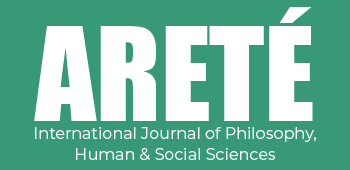The Female Disobedience. Espistemologies, praxis and politics of resistance
The journal Areté invites researchers and scholars to contribute to a special issue entitled Le disobedienti/Female Disobedience with philosophical articles. The issue aims to explore ideas and practices of thinkers outside the canon who, through their work, have disobeyed rules, conventions, and authorities, thereby opening new paths in thought and practice. From forgotten female philosophers and groundbreaking intellectuals to anonymous heroines of daily resistance, this issue seeks to shed light on the transformative impact of disobedience, with particular attention to the contributions of women and marginalized voices in the philosophical domain.
Below are some potential (non-exhaustive) thematic areas:
- Disobedience, Identity, Intersubjectivity: How figures of disruption (referred here as Disobbedienti/dissenters) have redefined identity, challenging norms related to gender, belonging, and authority, and developing alternative perspectives on self-construction in relation to philosophical and psychoanalytic models.
- Philosophical Practices of Resistance: Disobedience as a philosophical praxis and a strategy of emancipation, revolt, and reclamation across various historical, sociopolitical, educational contexts.
- Epistemic Disobedience and Marginality: Analyses of disobedient epistemologies that counteract dominant knowledge systems and their structures of power.
- Ethics and Politics of Disobedience: How the ethics of disobedience and political practices grounded in ethical and political models develop and impact dominant value systems, particularly regarding justice, freedom, and human dignity.
- Hidden Traditions and Genealogies: Rediscovering traditions of critical thought that oppose the canonization of knowledge and the reproduction of theoretical models within academic and educational systems.
Submission Guidelines: We welcome unpublished articles in Italian, English, German, French, and Spanish, ranging from 5,000 to 7,000 words. Authors are invited to submit an abstract (maximum 300 words) and a short biography (maximum 100 words) by January 10. The deadline for submission of completed manuscripts is May 31.
Submission Process: Abstracts and manuscripts should be sent to aretejournal@unimarconi.it, s.fortuna@unimarconi.it, stefania.achella@unich.it, and p.brook@unimarconi.it. After the selection of abstracts, submissions will not be automatically accepted but will undergo blind peer review in accordance with current standards for scientific journals recognized by Anvur.
Timeline:
- Abstract submission deadline: January 10
- Notification of abstract acceptance: January 31
- Manuscript submission deadline: May 31
- Definitive notification of manuscript acceptance: July 1

